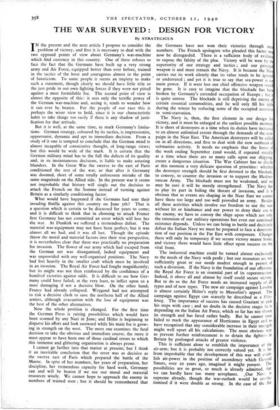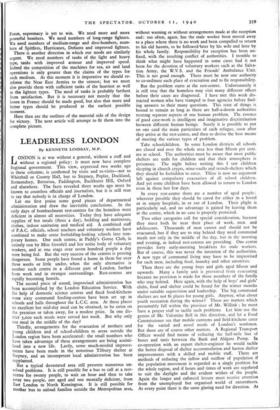THE WAR SURVEYED : DESIGN FOR VICTORY
By STRATEGICUS
2.N the present and the next article I propose to consider the problem of victory; and first it is necessary to deal with the two opposed points of view about Germany's war-machine which find currency in this country. One of these refuses to face the fact that the Germans have built up a very strong army and Air Force, equipped better than ever before, trained in the tactics of the hour and courageous almost to the point of fanaticism. To some people it seems an impiety to make such a statement, though clearly we should have little title to the just pride in our own fighting forces if they were not pitted against a most formidable foe. The second point of view is almost the opposite of this: it sees only the terrific power of the German war-machine and, seeing it, tends to wonder how it can ever be beaten. For the people of our race this is perhaps the wiser view to hold, since it is our characteristic habit to take things too easily if there is any shadow of justi- fication for that attitude.
But it is well, at the same time, to mark Germany's limita- tions. German strategy, coloured by its tactics, is impressionist, opportunist, dynamic and apt to immediate decision. From a study of it one is tempted to conclude that the German mind is almost incapable of consecutive thought, of long-range views; but this would be wide of the mark. It is certain that the German military mind has to the full the defects of its quality and, in its instantaneous decisions, is liable to make amazing blunders. In the Great War the swerve to the east of Paris conditioned the rest of the war, so that after it Germany was doomed, short of some totally unforeseen mistake of the same magnitude on the Allied side. In the present war it seems not improbable that history will single out the decision to attack the French on the Somme instead of turning against Britain as a similarly conditioning factor.
What would have happened if the Germans had sent their invading flotilla against this country on June 5th? That is a question which is certain to be discussed for years to come; and it is difficult to think that in choosing to attack France first Germany has not committed an error which will lose her the war. At Dunkirk we suffered a tremendous defeat. The material war-equipment may not have been perfect; but it was almost all we had, and it was all lost. Though the episode threw the moral and material factors into their true perspective, it is nevertheless clear that there was practically no preparation for invasion. The flower of our army which had escaped from the German net was disorganised, lacked equipment and was unprovided with any well-organised positions. The Navy had lost heavily in the smaller craft which must be involved in an invasion. The Royal Air Force had fought magnificently; but its might was not then reinforced by the confidence of a hundred victories against odds. It is difficult to see how Ger- many could have failed, at the very least, to inflict upon us a most damaging if not a decisive blow. On the other hand, France had already collapsed. Weygand had not attempted to risk a decisive clash to save the northern half of the Allied armies, although evacuation with the loss of equipment was the best of the other alternatives.
Now the whole position is changed. For the first time the German Press is raising possibilities which would have been scorned by any Nazi in June; and Hitler is beginning to disperse his effort and look eastward while his main foe is grow- ing in strength on the west. The more one examines the fatal decision to take the -obvious and immediate course, the more it must appear to have been one of those cardinal errors to which this immense and glittering organisation is always prone.
I cannot go farther into that matter at present; but I think it an inevitable conclusion that the error was as decisive as the swerve east of Paris which prepared the battle of the Marne. In spite of her numbers, her years of preparation, her discipline, her tremendous capacity for hard work, Germany can and will be beaten if we use our moral and material resources wisely. We cannot hope to approach the enemy in numbers of trained men ; but it should be remembered that the Germans have not won their victories through met numbers. The French apologists who pleaded this factor ma now be disregarded. There is a sufficient body of eviden to expose the falsity of the plea. Victory will be won by t superiority of our strategy and tactics ; and our princip weapon is and must remain the Navy. It is because the Nal, carries out its work silently that its value tends to be ignore or underrated ; and yet it is true to say that sea-power is o main power. If it were lost our chief offensive weapon woe] be gone. It is easy to imagine that the blockade has bet broken by Germany's extended occupation of Europe ; but i is quite untrue. The blockade is still depriving the enemy certain essential commodities, and he will only fill his lab during the winter by reducing some of the occupied countre to semi-starvation.
The Navy is, then, the first element in our design fo victory, and it must be enlarged at the earliest possible moment It is short of destroyers at a time when its duties have increase to an almost unlimited extent through the demands of the cam- paign in the Near East. The American destroyers will be cane on in all directions, and first to deal with the new outbreak of submarine activity. It needs no emphasis that the losses of the week ending September 22nd would, if repeated steadily at a time when there are so many calls upon our shipping, create a dangerous situation. The War Cabinet has to deae at this moment a very delicate question of priorities: whether the destroyer strength should be first devoted to the blockade, to convoy, to counter the invasion or to support the Mediter- ranean Army. The blockade must not be weakened, and we may be sure it will be merely strengthened. The Navy has to play its part in foiling the threats of invasion, and it is obvious that as events are shaping in the Near East we cannot have there too large and too well provided an army. Besides all these activities which involve our freedom to use the seas without let or hindrance and our power to deny their use to the enemy, we have to convoy the ships upon which not only the extension of our military operations but even our continued existence depends. Unless we can bring to battle and decisively defeat the Italian Navy we must be prepared to face a deteriora- tion of our position in the Far East with composure. Changes there will only be temporary if we secure victory nearer home, and victory there would have little effect upon success on the vital front.
The industrial machine could be turned almost exclusively to the needs of the Navy with profit ; but our resources arc not sufficiently great or our needs modest enough to permit of such a diversion. If the Navy is the foundation of our offensive, the Royal Air Force is an 'essential part of its superstructure. Indeed, it above all and almost by itself could secure victory. But to do so the Air Force needs an increased supply of all types and of new types. The new air campaign against London is almost certainly Hitler's reply to Mussolini's appeal. The campaign against Egypt can scarcely be described as a Blitz- krieg. The importance of success has caused Graziani to pick his steps with care ; and no doubt in the decisive stages he is depending on the Italian Air Force, which so far has not shown its strength and has fared rather badly. But he cannot have failed to mark the appearance of Hurricanes in Egypt and to have recognised that any considerable increase in their strength might well upset all his calculations. The most obvious way to prevent further reinforcement is to detain the fighters in Britain by prolonged attacks of greater violence. This is sufficient alone to establish the importance of the air-arm; but it is probably not correctly valued yet. It 15 far from improbable. that the development of this war will estab- lish air-power in the position of ascendency which General Smuts, over 20 years ago, imagined it might possess. The possibilities are so great, so much is already admitted, that we can hardly have too many aeroplanes. Our Nav, 15 supreme already, though the war-outlook would be revolu- tionised if it were double as strong. In the case of the Air Force, supremacy is yet to win. We need more and more powerful bombers. We need numbers of long-range fighters. We need numbers of medium-range and dive-bombers, num- bers of Spitfires, Hurricanes, Defiants and improved fighters.
There is another direction in which our needs are similarly urgent. We need numbers of tanks of the light and heavy type, tanks with improved armour and improved speed. Indeed the competition of the machines for sea, air and land operations is only greater than the claims of the types for each medium. At this moment it is imperative we should re- inforce the Near East Armies to the utmost; but we must also provide them with sufficient tanks of the heaviest as well as the lightest types. The need of tanks is probably farthest from satisfaction. But it is necessary not merely that the losses in France should be made good, but also that more and better types should be produced at the earliest possible moment.
Here then are the outlines of the material side of the design for victory. The next article will attempt to fit them into the complete picture.



























 Previous page
Previous page